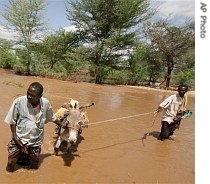2006年VOA标准英语-Devastating Floods in Ethiopia Far from Over(在线收听)
By Lisa Schlein
Genava
23 August 2006
The World Food Program says devastating floods that hit Ethiopia earlier this month are continuing to cause problems. The United Nations reports that an estimated 48,000 people have been made homeless and hundreds of people have been killed or are missing.
-------
 Abdi Omar Elmi, left, who lost a son and two nephews in the floods, helps lead a donkey across a submerged bridge after severe floods hit the Somali Region of Eastern Ethiopia |
||
WFP spokeswoman Christiane Berthiaume says water is rising to critical levels at three dams in the west, south and north.
"The government will probably have to open the dams to release the water," she noted. "But, that means there will be some flooding around those dams if they have to do that. So, they have been telling people on and on to leave the area, that there is a danger of flooding, to leave to higher places."
The first big flood hit Ethiopia August 6. Heavy rains in mid-August caused the Omo River to burst its banks, flooding large areas of land in the south and west, some 800 kilometers south of the capital, Addis Ababa.
Berthiaume says thousands of people are marooned and encircled by floodwaters in isolated areas of the Omo River valley. She says the flooding killed more than 300 people, washed away almost three thousand livestock and destroyed 760 grain reserves.
"People are still stranded in the waters right now," she added. "Our colleague from WFP is there, has been there. He is traveling by boat. He says a lot of people do not want to go. They want to stay even if they are surrounded by water because they do not want to leave their animals. This is their only source of revenue. So, they do not want to go. But, the government is doing its utmost. It has sent boats, helicopters."
Earlier, flash floods in the badly hit town of Dire Dawa killed more than 250 people. Many are still missing and it is feared the national death toll is likely to rise.
The World Food Program says the lashing rain and devastated infrastructure are hampering relief efforts. American soldiers from a U.S. military base in neighboring Djibouti arrived in Dire Dawa at the weekend to assist the emergency services in the post-flood operations. The government is appealing to the international community to provide urgent search and rescue assistance in the form of helicopters and motor boats.
The United Nations says many flood victims are at risk from water-borne diseases, including acute diarrhea and cholera. It says funds are urgently needed so WFP and other aid organizations can expand their operations.